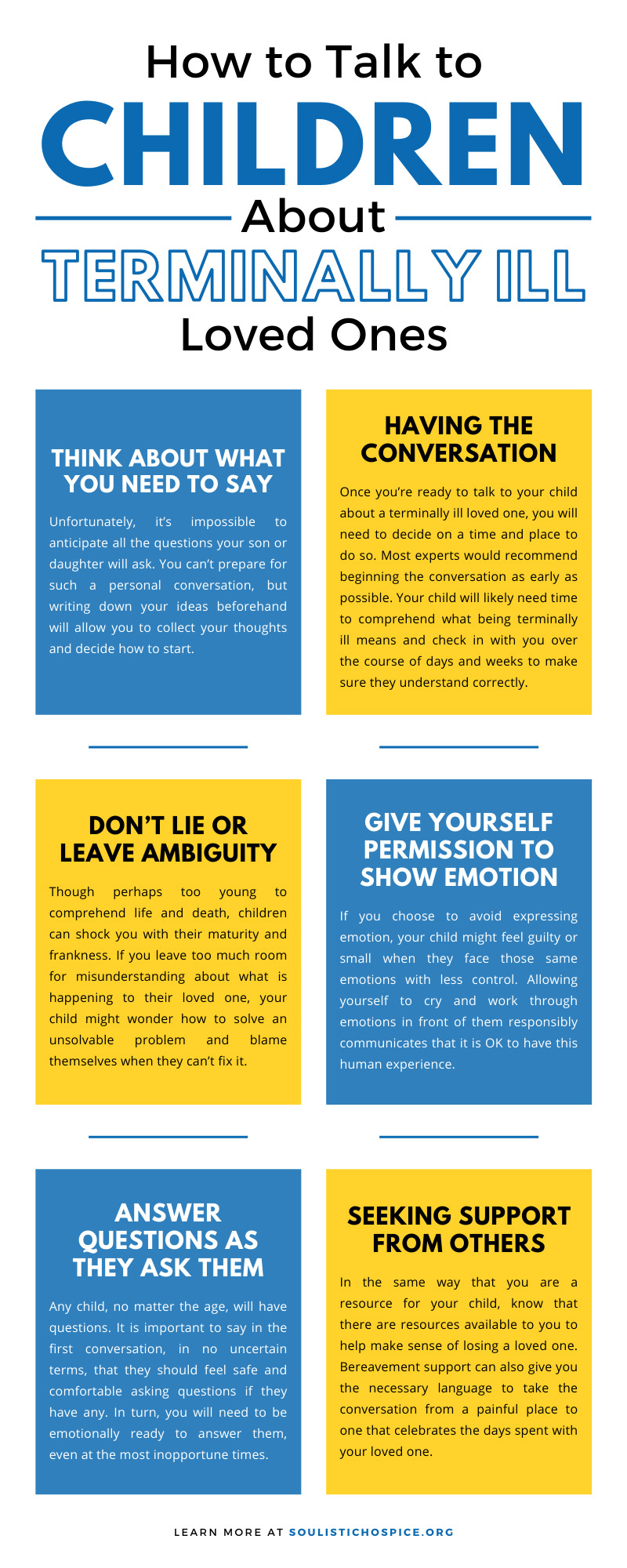
Parents have a uniquely challenging position when a loved one has been diagnosed with a terminal illness. You are responsible for assisting your child in understanding still foreign ideas, even when they may still be foreign to you. Though no two conversations are ever the same, these tips for how to talk to children about terminally ill loves ones will provide you with a template on how to begin this conversation with your son or daughter.
Preparing Yourself for the Talk
Even as an adult, a loss can bring us right back to those same childhood feelings of fear, hurt, and loneliness without the solutions our adult problems usually have. It is important to be fair to yourself throughout the process. It isn’t easy, and that’s OK. Your job is to explain, be a resource, and give your child a chance to navigate this situation with you, not to fix anything. Here are some ways to prepare before you sit down with your child.
Ask Another Person To Be There
Whether you wish to have this conversation alone or with someone else there to support you, your choice is valid. The people present to broach this topic with them are those they trust who can help them process new ideas in the days and weeks following. Differing perspectives can help a child tremendously, though you will want to make sure that the message they receive is consistent enough to process.
Think About What You Need To Say
Unfortunately, it’s impossible to anticipate all the questions your son or daughter will ask. You can’t prepare for such a personal conversation, but writing down your ideas beforehand will allow you to collect your thoughts and decide how to start.
You may need to speak about the realities of illness and what will happen when you, your family, or your child ages. Practicing what you will say in a mirror may seem silly, but it gives you a chance to build confidence so that you can be the authority that your child leans on for guidance.
Having the Conversation
Once you’re ready to talk to your child about a terminally ill loved one, you will need to decide on a time and place to do so. Most experts would recommend beginning the conversation as early as possible. Your child will likely need time to comprehend what being terminally ill means and check in with you over the course of days and weeks to make sure they understand correctly.
You will need to choose where you have the conversation as well. You may want to pick a place that you know your child feels safe, such as your home’s living space. Avoid discussing your ill family member in a public area where your child is less inclined to ask the questions they have or express their feelings.
The following tips will help you as you have the conversation itself.
Don’t Lie or Leave Ambiguity
Though perhaps too young to comprehend life and death, children can shock you with their maturity and frankness. If you leave too much room for misunderstanding about what is happening to their loved one, your child might wonder how to solve an unsolvable problem and blame themselves when they can’t fix it.
As painful as it is, do your best to express the truth and define terminal illness for your child. That said, do not omit positivity from the conversation either. Celebrate memories and encourage them to see that their loved one is being cared for, respected, and safe as they enter the end of their life.
Give Yourself Permission To Show Emotion
Being strong for your son or daughter does not necessarily mean remaining stoic when in pain. If you choose to avoid expressing emotion, your child might feel guilty or small when they face those same emotions with less control. Allowing yourself to cry and work through emotions in front of them responsibly communicates that it is OK to have this human experience. Though we may worry about frightening our children, admitting that this situation hurts will only make things easier to understand.
Answer Questions as They Ask Them
Any child, no matter the age, will have questions. They may not ask them right away or may form them later as they continue to interact with the world with the new information you’ve given them on their shoulders. It is important to say in the first conversation, in no uncertain terms, that they should feel safe and comfortable asking questions if they have any. In turn, you will need to be emotionally ready to answer them, even at the most inopportune times.
Seeking Support From Others
Grief counseling is an essential tool for those preparing for and experiencing loss. In the same way that you are a resource for your child, know that there are resources available to you to help make sense of losing a loved one. Bereavement support can also give you the necessary language to take the conversation from a painful place to one that celebrates the days spent with your loved one.
Visiting Your Loved One
If your son or daughter wants to see their loved one in hospice after your discussion, you have a big decision to make. Only you will know if your child is ready. There is undoubtedly value in allowing both your terminally ill loved one a chance to see your child and vice versa, but it is a harrowing experience that you are free to avoid.
Should you choose to bring your child to the hospice facility, try to describe the entire process before they go. Think of all the frightening aspects, like the uniforms, lights, and equipment they will see. Do your best to describe how their loved one looks, speaks, and moves right now. Visiting their loved one can give a child both context and closure, but it is best to take them home if they change their mind.
Parents have many responsibilities as beloved family members enter the last stages of their lives. Our team at Soulistic Hospice in Green Valley, AZ, is honored to help residents of southern Arizona as they navigate through this difficult process. Our social workers provide both emotional and spiritual counseling to patients and their families to best understand the process moving forward. We are devoted to offering the comfort, support, and respect our patients and their loved ones need.









